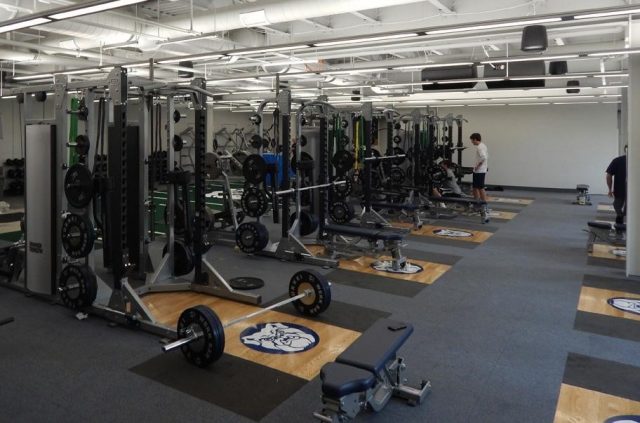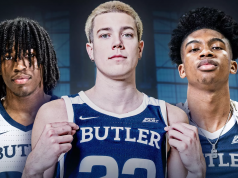The 2020-2021 academic year — more commonly referred to as “the COVID year” — forced a lot of Butler’s club sports to shut down. Almost all were prohibited from competition and many ceased to exist altogether. This year, nearly three years later, some of these programs are finally coming back to campus. Of those clubs is the club lifting program, which since its return at the beginning of the spring semester has grown to over 60 active members.
The club is led by junior economics and Chinese double major Joshua Ulisano, who was instrumental in the push for bringing this organization back on campus. With Ulisano as their president, the club’s entire executive board also includes Drake Guerrero, Chris Gianakas, Hunter Johnson and Aaron Ryan.
Butler has two different types of club sports: recreational and competitive. Competitive club teams compete against other schools, while recreational teams only hold on-campus practices and events for fun. Currently, the lifting club is recreational.
To bring the club back, Ulisano, Guerrero, Gianakas, Johnson and Ryan had to go through the process of presenting the club to SGA, student affairs, and eventually Nick Ames, the Assistant Director of Recreation and Wellness – Sports Programs.
The previous existence of the club helped their case, and when asked why he wanted to bring their presence back, Ulisano mentioned how important weight lifting is to him and his friends.
“When you go to the HRC, it’s pretty much packed every day,” Ulisano said. “So we wanted to provide people with an opportunity to be able to lift together when the HRC isn’t so full of students at our events. Lifting is also a social activity, as when you start going to the gym you meet a lot of people, so we wanted to create a community to support that.”
Ames echoed Ulisano, mentioning how important he felt having a weight lifting community was at Butler.
“I was all for bringing this club back,” Ames said. “There are a lot of reasons why you would bring something like this back. It just adds another element to the student experience. Obviously anyone can just go to the HRC and workout, but having that group makes a difference to those who really love it.”
The club features a variety of different students in it. Many of its members are in the club because of their love for powerlifting or bodybuilding while others simply just like weight lifting as a form of physical activity. The club also has its share of experienced lifters and beginners, as they strive to form an inclusive environment for all students with interest, not just die-hard gym lovers.
“The biggest stereotype we have to deal with is people who lift just being mindless big guys who just care about their ego,” Ulisano said. “If there’s one misconception I want this club to get rid of is that we are in it just because we are brainless hunks who want to lift together. Like I said before, lifting is not just a brainless activity, there’s a social aspect to it, and we want people to know that we’re not those guys in the gym screaming at each other but we’re the type of people who just want to support each other.”
Breanna Van Dreel, a junior criminology and psychology major, is one of the club’s members who felt intimidated at first but now loves her experience in the organization.
“It’s definitely intimidating to enter a space with people who know what they’re doing when you don’t,” Van Dreel said. “I’ve been lifting for about three years now, but I’m still learning and not entirely confident in myself yet. And of course, I’ve heard negative things about women who are trying to be more muscular. But now looking back on it, I don’t know why I was so hesitant because the experience could not be more enjoyable.”
Both Van Dreel and Ulisano encourage weight lifters of all levels to join the club regardless of experience. Ulisano in particular mentions the club’s focus on self competition rather than competing against others.
“I originally thought it would be a good idea to have bench press competitions or squat competitions within ourselves,” Ulisano said. “But then I quickly realized how unfair and scary that can be for our beginners, so instead we do max out days, where we want all our members to max out on bench or squat and then see if the next time you can do more than last time. That way our focus is on improvement and not comparing yourself to others, because when you lift you should always be focusing on yourself and not others.”
Ulisano says many of the club’s members would love for lifting to be competitive again, but the rules of Butler club sports requires returning or new clubs to be recreational for at least one year. However, the club weightlifting program was competitive in the past, which helps their case to return to that level in the future.
“Obviously, their competitive history will help them if they want to be competitive again,” Ames said. “But ultimately that will depend on the future students that they get in the club, because that won’t happen for at least some time. They will have to build up a budget again and get enough of an interest, so hopefully in a couple of years they find students who are enthusiastic enough to continue their momentum.”
Though they remain a new organization and relatively unknown to some students, the future of club weight lifting is looking bright. For more information about this rising club, they are reachable by email at clubsports@butler.edu, or their Instagram page @buliftingclub.










